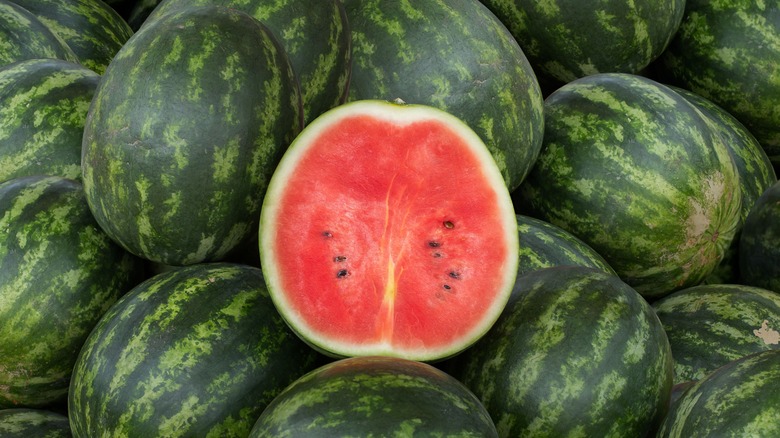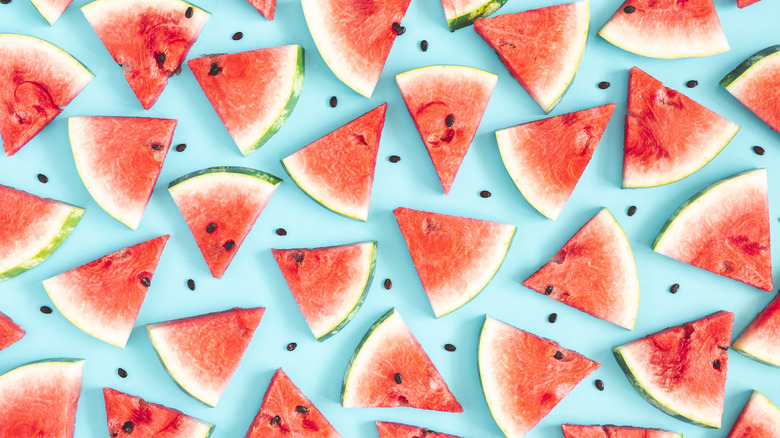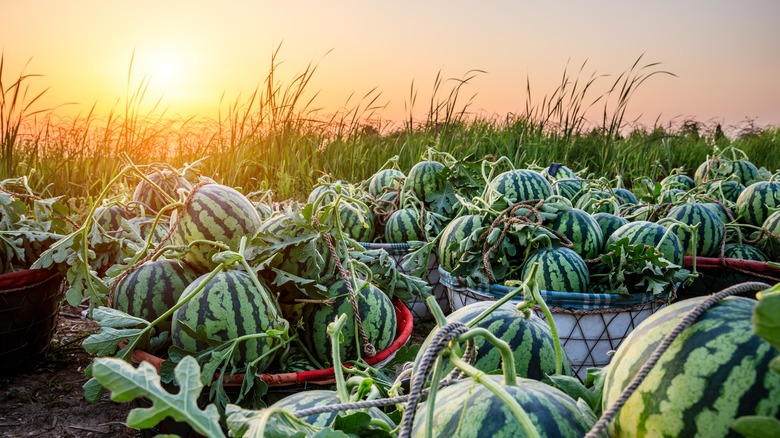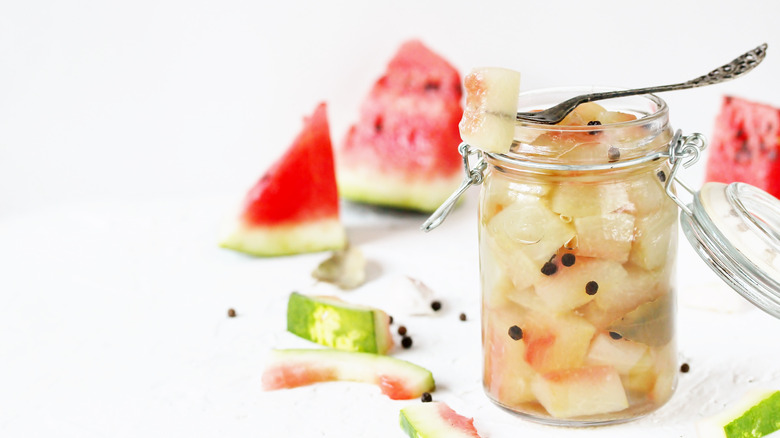Read This Before Throwing Out Watermelon Rind
You may be surprised to know that many food scraps that we unceremoniously and absentmindedly cut away and discard are actually entirely edible, and in some cases, outrageously healthy. That is the precise case for the watermelon rind or skin, the oft-forgotten component of the fruit synonymous with summer, sticky hands, and ruby red-stained faces. For whatever reason, it's often assumed that the watermelon flesh is the edible component of the fruit, and the rind is immediately disposed of in most instances. However, this shouldn't be the case.
Last month, the National Watermelon Promotion Board (NWPB) began an initiative called "Use the Whole Watermelon," which is a campaign that advocates for the "taste, health, economic, and sustainable benefits of the full watermelon, inside and out," as noted by The Packer. The same outlet notes that only "18% of watermelon consumers use the whole watermelon" and that less than 40% are actually aware that the rind is indeed edible. Clearly, it's time to correct that misconception.
The tenets of the watermelon movement
According to The Packer, Stephanie Barlow — senior director of communications at NWPB – said the following in a release: "Need to eat healthy? Use the whole watermelon. Need a wallet-friendly produce option? Use the whole watermelon. Want to help minimize food waste? Use the whole watermelon. It's a win-win-win for watermelon." The effort will promote a myriad of components and assets that will highlight watermelon as a healthy, affordable, and sustainably-sound snack choice.
Watermelon.org includes a cornucopia of #UseTheWholeWatermelon assets, such as an interactive watermelon "butchery" tutorial, recipes, tips, and tricks, a "food waste footprint tricker," a sweepstakes, and varying instructional videos such as "how to cut and use the rind" and "how to juice." The rind is chockfull of healthy vitamins and minerals, and consuming the rind also cuts down on food waste and negative environmental effects. There will also be a slew of social media efforts in order to advertise the campaign, which runs through September 2 (via The Packer).
How healthy is watermelon?
Watermelon is packed with antioxidants such as lycopene, vitamin C, and beta-carotene, is super hydrating (it's 91% water), can promote heart health, can be helpful in weight loss, and is helpful at combating cancer, according to Livestrong.
Organic Facts notes the watermelon's amazing laundry list of healthy nutrients and vitamins, including vitamins C, A, and B6, zinc, potassium, chlorophyll, flavonoids, and phenolic compounds. It can help promote health skin, improve the immune system, assist in mitigating morning sickness during pregnancy, and combat chronic diseases and pain.
According to Healthline, the rind ("the green skin that keeps all that water-logged delicious fruit safe") and the actual green skin are both entirely edible. The rind can reduce blood pressure, is full of fiber, can promote the dilation of blood vessels, and improve oxygen delivery to muscles, and can even act as a libido enhancer.
How to best use watermelon rind?
Watermelon.org notes that watermelon rind is most often pickled, which is a terrific means of using up the rind – as well as being absolutely delicious and a bright punch of acid. Watermelon rind can also be juiced along with the flesh for a refreshing, brightly-colored juice which can then be consumed as is or even used in a dish, such as a gazpacho. The watermelon rind can also be cooked just like any other vegetable, so try thinly slicing it and cooking it up alongside your favorite proteins or vegetable and serving over a grain.
Mindbodygreen states that watermelon (rind included) is a superb addition in healthy smoothies, especially highlighting a drink made of strawberries, lemon juice, honey, ginger, ice, and — of course — watermelon. MindBodyGreen also notes that watermelon rind salsas, salads, and kebabs are great summertime options in which to use the entire fruit. You can even use it in homemade watermelon ice pops!
Interestingly enough, watermelon seeds actually contain a "surprising amount of health benefits," according to Country Living. Clearly, the watermelon is chockfull of benefits, so why isn't it often included amongst the list of 'superfoods?' It is certainly well warranted.



